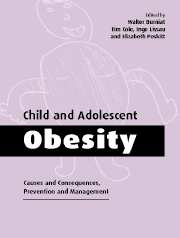Book contents
- Frontmatter
- Contents
- List of contributors
- Foreword
- Preface
- Part I Causes
- Part II Consequences
- 7 Clinical features, adverse effects and outcome
- 8 The obese adolescent
- 9 Prader–Willi and other syndromes
- 10 Hormonal and metabolic changes
- 11 Risk of cardiovascular complications
- Part III Prevention and management
- Index
9 - Prader–Willi and other syndromes
Published online by Cambridge University Press: 02 November 2009
- Frontmatter
- Contents
- List of contributors
- Foreword
- Preface
- Part I Causes
- Part II Consequences
- 7 Clinical features, adverse effects and outcome
- 8 The obese adolescent
- 9 Prader–Willi and other syndromes
- 10 Hormonal and metabolic changes
- 11 Risk of cardiovascular complications
- Part III Prevention and management
- Index
Summary
Introduction
Most children with obesity are basically normal healthy children with simple, primary or exogenous obesity. Some have psychological problems or orthopaedic complaints and simple obesity is also more common in children with mild nonspecific mental retardation. Over time, children with simple obesity also develop the health consequences of severe obesity, but their lack of problems in early childhood is often remarkable. By contrast, children with ‘pathological’, secondary or endogenous obesity have obesity in association with a wide variety of other problems. Obesity is rarely their presenting problem. True secondary obesity currently accounts for only a small proportion (<5%) of cases of obesity. However developments in understanding of the genetics of obesity may change this in the future as specific diagnoses become possible for increasing numbers of previously ‘simple’ obesity cases (Farooqi & O'Rahilly, 2000).
Secondary obesity occurs in association with two main types of condition: endocrine disorders and genetic/chromosomal abnormalities (Table 9.1). Clinical features which suggest that obesity may be part of a wider paediatric problem are listed in Table 9.2. Underlying conditions are of two general kinds: acquired endocrine conditions and syndromes which are usually congenital, although obesity may not be apparent in very early life.
Endocrine problems
Hypothyroidism
Typically hypothyroidism is associated with fat gain and in adult life this may be a major feature. In childhood, however, slowed linear growth is usually the feature which causes most concern. Obesity is rarely more than moderate.
- Type
- Chapter
- Information
- Child and Adolescent ObesityCauses and Consequences, Prevention and Management, pp. 171 - 188Publisher: Cambridge University PressPrint publication year: 2002



